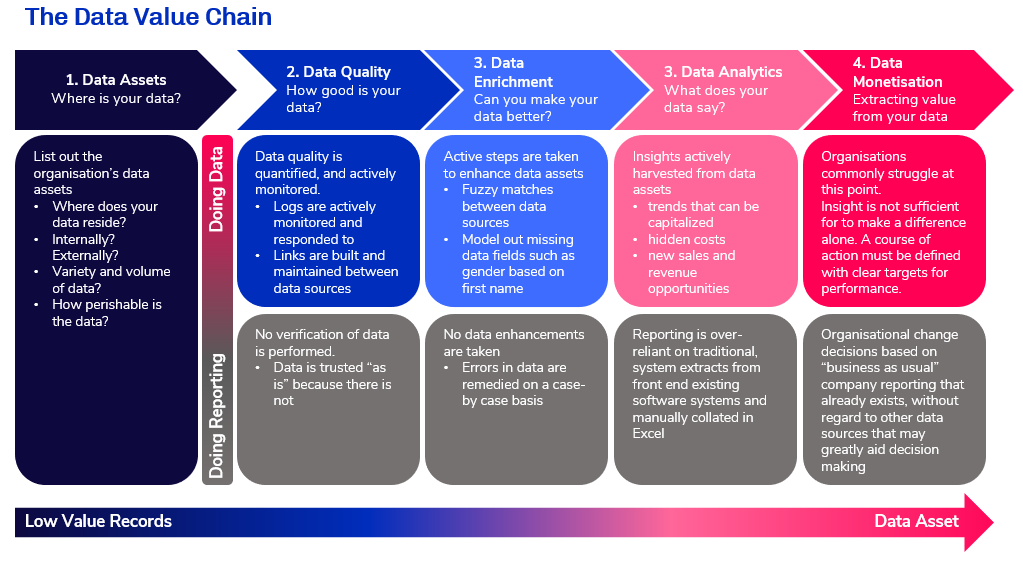
Sep 30, 2019
Data might be the new oil, but how do organisations best realize that value?
What is data monetisation?
The act of generating measurable economic benefits from available data sources (analytics). There are two types of data monetisation:
- Internal data monetisation: using data internally within an organisation for an economic benefit. This could come from:0
- Uncovering of efficiencies, leading to cost reductions
- Identifying revenue opportunities, leading to increased revenue
- Better quantifying risk leading to lower provisions, or better risk management, leading to indirect cost reductions or revenue improvements
- External data monetisation: the preparation and direct sale of data to third parties so that they may use it internally for data monetisation in their business. This can be also be achieved via data brokers who may aggregate data from various sources in order to make the overall dataset even more complete and therefore valuable. Examples of this would be a Google or a Facebook who monetises their user data for targeted marketing.
Ultimately, all data monetisation is internal even when monetising your data externally, you need to prove to your clients how they will use the data in order to generate value from it.
Defining the investment case
In the context of monetisation, it is the last step of the data value chain. In which case the investment proposition is:
Is the cost of building my data pipeline going to pay off in the form of lower costs, increased revenues or better risk management?
With internal data monetisation, all returns will come out of the pre-existing business. So the question is to think about how these returns will come from within the business.
Like any other type of investment, we apply the core concepts of investment and return.
Return on Investment and Payback Period
Before going into an investment, you define expected return and the amount of time you would expect to see that return. The same goes for data pipelines. Items to think about are:
- What are the key areas where the business could reduce costs or increase revenue?
- What changes is the business ready for at this point in time?
- If the data proves or disproves a hypothesis, are changes implementable within an acceptable period of time?
- What are some tangible metrics to data monetisation?
- g. Within 2 months, this data pipeline will be able to bypass a reporting task which will free up 5 hours of an FTE per week.
- What is the Minimum Viable Product?
- How do you prove the concept without over-investing?
- What are your defined goals?
- Is your organisation ready to fund the full build if the concept is proven?
Capital cost vs. Operating costs
As with any technology expenditure, think about the total costs of ownership, not just the cost of the build of the data pipeline
- How many FTEs will be needed to support the data pipeline in the future?
- Will you need ongoing reporting in order to reduce costs, increase revenue or mitigate risk on an ongoing basis? If so, why or why not?
Common Pitfalls
Below, are some of the common pitfalls that we see when organisations try to monetise their data without working through the proposition from an investing lens.
Investing in insights without action levers
Insights are only as valuable as the incremental value add that the business can action with that insight. With the advent of detailed and large datasets, it is easy for an organisation to invest in detailed and complex insights, for which they have no timely action levers.
Over-investing in state-of-the-art data technologies
It is easy to start a data strategy with the building of a state-of-the-art data pipeline. In many cases, the funds are invested based on how much data is available, not by how much a business needs the data to make decisions.
This type of decision-making leads to top of the line technologies built on data for which no action levers are possible, and missing or patchy data pipelines built on top of data for which timely reporting is crucial for the business.
Successful Data Monetisation
There are many ways that data can add value to a business and a lot of varying data monetisation strategies.
By grounding data investment decisions in tried and tested investment principles, organisations can bootstrap themselves to the very cutting edge.




